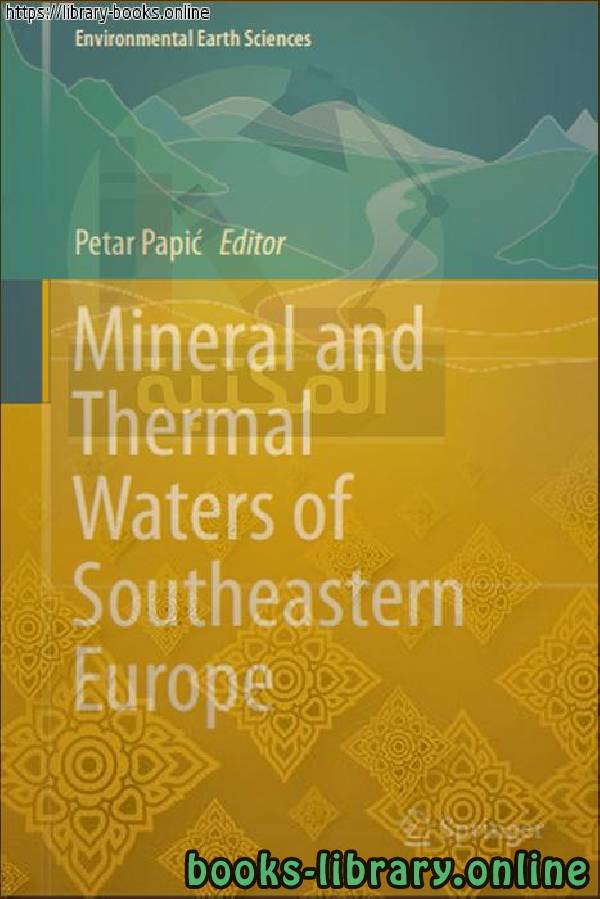📘 ❞ Mineral and Thermal Waters of Southeastern Europe ❝ كتاب ــ Petar Papić اصدار 2016
Biology Books - 📖 كتاب ❞ Mineral and Thermal Waters of Southeastern Europe ❝ ــ Petar Papić 📖
█ _ Petar Papić 2016 حصريا كتاب ❞ Mineral and Thermal Waters of Southeastern Europe ❝ 2024 Europe: نبذه عن الكتاب: Geology South Eastern Europe Vladica Cvetkovic, Dejan Prelević Stefan Schmid Abstract The region (SEE) occupies an important segment the Alpine–Himalayan collisional orogenic belt consists several Phanerozoic mobile belts SEE inherits its geology from evolution of the Vardar Tethys ocean, which existed in between Eurasian (Europe) and Gondwana (Africa) continental plates relicts presently occur along the Vardar–Tethyan mega suture This synthesis, therefore, (1) pre , (2) synand (3) post Vardar–Tethyan Pre on the European side is reflected by geological units formed Precambrian to Mesozoic times include Moesian platform, Dacia unit the Rhodopes On Gondwana side, it represented External Dinarides, the Dalmatian Ionian Zone Stable Adria (Apulia), all principally from Paleozoic to Mesozoic Syn encompass bulk framework They are a physical record former existence oceanic lithosphere, being dominantly by ophiolites trench accretionary wedge (mélange) assemblages, originated and were reworked during life span Post Vardar– Tethyan refers time period final closure the Vardar until present It comprises rocks that stratigraphically overlie the seal contacts and the surrounding characterized rapid extension coupled with exhumation lower crustal material, high heat flow, both intrusive extrusive magmatism considerable lithosphere thinning Biology Books مجاناً PDF اونلاين Biologically Biology natural science concerned study life, various forms function, how these organisms interact each other environment word biology Greek made up two words: bio (βίος) meaning And loggia ( λογία) means or Biology: similarity vegetation animal cover edges African American states, same fossil Branches biology Biology ancient thousands years old modern began nineteenth century has multiple branches Among them are: Anatomy Botany Biochemia Biogeography Biofisia Cytology cell science Ecology environmental science Development Embryology embryology Genetics genetics Histology histology Anthropology anthropology Microbiology bacteriology Molecular Biology Physiology functions organs Taxonemia taxonomy Virology virology Zoology zoology

نبذه عن الكتاب:
Geology of South-Eastern Europe
Vladica Cvetkovic, Dejan Prelević and Stefan Schmid
Abstract The region of South-Eastern Europe (SEE) occupies an important
segment of the Alpine–Himalayan collisional orogenic belt and consists of several
Phanerozoic mobile belts. The SEE region inherits its geology from the evolution of
the Vardar Tethys ocean, which existed in-between the Eurasian (Europe) and
Gondwana (Africa) continental plates and which relicts presently occur along the
Vardar–Tethyan mega-suture. This synthesis, therefore, consists of (1) pre-, (2) synand (3) post-Vardar–Tethyan geology of SEE. Pre-Vardar–Tethyan geology on the
European side is reflected by geological units formed from Precambrian to
Mesozoic times and include the Moesian platform, the Dacia mega-unit and the
Rhodopes. On the Gondwana side, it is represented by the External Dinarides, the
Dalmatian-Ionian Zone and Stable Adria (Apulia), all principally formed from
Paleozoic to Mesozoic times. The Syn-Vardar–Tethyan units encompass the bulk of
the geological framework of SEE. They are a physical record of the former existence of the Mesozoic oceanic lithosphere, being represented dominantly by
ophiolites and trench/accretionary wedge (mélange) assemblages, which originated
and were reworked during the life-span of the Vardar Tethys. The Post-Vardar–
Tethyan geological evolution refers to the time period from the final closure of the
Vardar Tethys until present. It comprises all rocks that stratigraphically overlie
the Vardar–Tethyan mega-suture and seal the contacts between the mega-suture and
the surrounding geological units. This is the time characterized by rapid extension
coupled with exhumation of the lower crustal material, high heat flow, both
intrusive and extrusive magmatism and considerable lithosphere thinning.
#2K
0 مشاهدة هذا اليوم#58K
8 مشاهدة هذا الشهر#72K
4K إجمالي المشاهدات- 🎁 كن أول كاتب اقتباس في هذه الصفحة واحصل على هديّة 15 من النقاط فوراً 🎁

